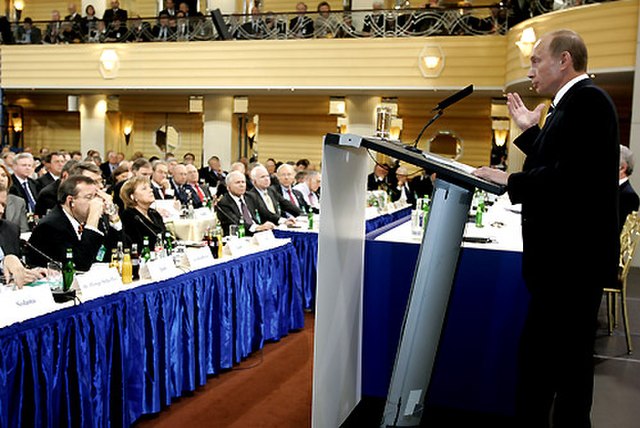The term Messiah can be defined as a belief or a religious devotion to an idea or cause. In history, leaders, and nations were considered messianic due to their acts, which were seen by a few or large sections of people as some sort of liberation from certain shackles they are in. When we discuss the evolution of Russian/Soviet messianism, it can be analysed from various points of history.
The emergence of Soviet Messianism was in March 1917, when Lenin arrived at the Finland station in Petrograd and gave a speech that contained his famous “April Theses”1. Through this document, Lenin portrayed himself as a Messiah who was showing a path to the world in the context of socio-political instability which was coupled with autocratic rule, war, and famine.
Lenin through his “April Thesis” tried to expose the war as “a predatory imperialist”2 one which is driven by its capitalist nature, which is not in line with the “revolutionary defensism”3. Lenin, who came onto the stage as a leader and founder of Communist International was reformulated into a Messiah, who had the power to bring in everlasting peace to the world.
Lenin is also known for his construction and implementation tactic of a worldwide socialist revolution which will build a world with peace and equity, which will transform the social and economic system of capitalism which is inherently failing and in which “those worst enemies of peace and socialism”4 George Kennan in his long telegram explicitly pointed out that the capitalist world was “beset with internal conflicts”5, which USSR wished to exploit.
This internal conflict which George Kennan discusses is where Lenin tries to introduce his messianic idea of socialist revolution which will function as a new model of the system in the world order, which will bring peace and tranquillity.
The next turning point in Soviet Messianism can be seen in the reforms undertaken by Mikhael Gorbachev through his Perestroika and Glasnost reformation. It saw a complete transformation of the soviet society, where liberal ideas were introduced, which gave social and economic openness to the state and society, this was more of a utopian restructuring done to create a new order in the world system in Politics and security.
In the 1988 speech at the United Nations, Gorbachev announced that the use of force must no longer constitute “Instruments of foreign policy”, and decided to unilaterally reduce five hundred thousand troops in Eastern Europe “in the next two years”6. This new idea put forward by Mikhail Gorbachev was welcomed by the west, but it was a self-destructing to the entire messianic way of reformulating the Soviet society and then the world peace.
The Messianic idea put forward by Gorbachev was an unsuccessful event in history which lead to the collapse of the Soviet Union and the influence communism and socialism had on the world stage. As Francis Fukuyama says, the “end of Communism”7 can be seen as an end of history, with the collapse of the USSR.
But this analysis of the end of the history of a state based on ideology, cannot be taken into consideration when it comes to the existence of the elements of Messianic influence in the Russian Society. As, it later gave birth to a new Messianic leader, Vladimir Putin, who is currently the President of the Russian Federation.
Post-Soviet Messianism
In the Post-Soviet period, if we analyse the set of leaders who have come to the helm of Russian President, Vladimir Putin has a Messianic influence on the Russian Society as well as on Russian Foreign Policy. It can be seen that Putin coming to the position of Russian President brought along with it, the re-centralisation of power and national interest is considered as a primary objective to achieve.

The functioning style of Putin as a leader of a Successor state of Soviet Russia was more pragmatism than a senseless ideological war. The new wave of change he bought to the functioning of the state and society of Russia pushed him to the status of a Messiah among the Russian people.
In the foreign policy sphere, although Putin tried to go well with the West, it was more of a distrust-based relationship.
In the current scenario of Russian involvement in Ukraine, we can see that he himself portrays as a Messiah who has entered Ukrainian territory to save the people of Donetsk and Luhansk regions from the neo-Nazi elements. And also the Pro-Russian region of Transnistria, which face ethnic violence for decades.
This Messianic way of involving another nation with a special military operation to keep away NATO from expanding further east to the Russian borders also shows the new foreign policy objective Russia has, which is more Pragmatism.
How Lenin and Wilson changed the world by Anton Fedyashin, https://nationalinterest.org/feature/how-lenin-wilson-changed-the-world-19900 ↩
Vladimir Lenin, “The Tasks of the Proletariat in the Present Revolution [aka The April Theses],” 20 April 1917 ↩
Vladimir Lenin, “The Tasks of the Proletariat in the Present Revolution [aka The April Theses],” 20 April 1917 ↩
Vladimir Lenin, “The Tasks of the Proletariat in the Present Revolution [aka The April Theses],” 20 April 1917 ↩
Kennan “Long Telegram,” 22 February 1946 ↩
Mikhail Gorbachev, “A Road to the Future,” UN Address, 7 December 1988 ↩
Francis Fukuyama, “The End of History?” The National Interest, summer 1989 ↩



